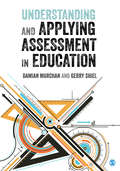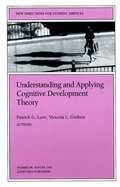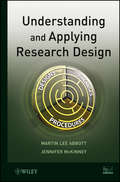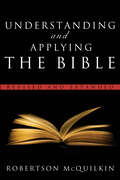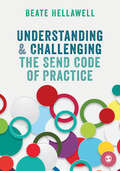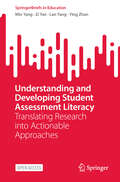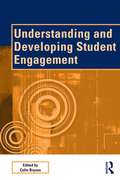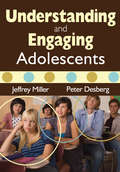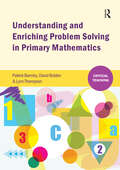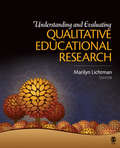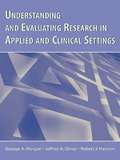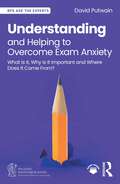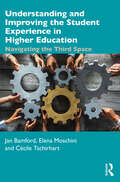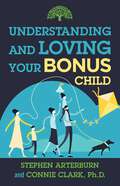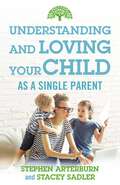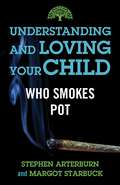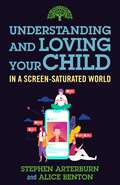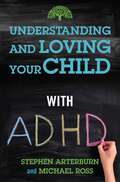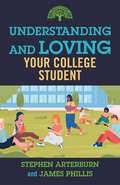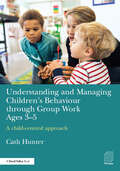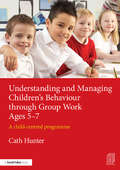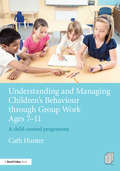- Table View
- List View
Understanding and Applying Assessment in Education
by Dr Damian Murchan Dr Gerry ShielAll teachers are responsible for assessing the children they teach and the outcomes of any assessment are important for individual learners and the wider school. This book is your one-stop-shop for understanding assessment in schools. It covers formative and summative approaches used across primary and secondary education, supporting a balanced overview with policy examples drawn from the UK, Ireland and wider international contexts. Designed as a pragmatic handbook for new teachers and those training to teach, the book discusses key principles of assessment, before providing guidance on developing and carrying out assessment in the classroom, and looking at how assessment information can be used to benefit your teaching and the children you teach.
Understanding and Applying Assessment in Education
by Dr Damian Murchan Dr Gerry ShielAll teachers are responsible for assessing the children they teach and the outcomes of any assessment are important for individual learners and the wider school. This book is your one-stop-shop for understanding assessment in schools. It covers formative and summative approaches used across primary and secondary education, supporting a balanced overview with policy examples drawn from the UK, Ireland and wider international contexts. Designed as a pragmatic handbook for new teachers and those training to teach, the book discusses key principles of assessment, before providing guidance on developing and carrying out assessment in the classroom, and looking at how assessment information can be used to benefit your teaching and the children you teach.
Understanding and Applying Cognitive Development Theory: New Directions for Student Services, Number 88
by Patrick G. Love Victoria L. GuthrieCreating learning environments and learning experiences for students is one of the primary purposes of student services. <P><P>Student services professionals need to have a solid understanding of the cognitive development of college students in order to design activities that will enhance that development. This issue of New Directions for Student Services reviews five theories of the cognitive development of college students and explores the applications of those theories for student affairs practice. The theories shed light on gender-related patterns of knowing and reasoning; interpersonal, cultural, and emotional influences on cognitive development; and people's methods of approaching complex issues and defending what they believe. This is the 88th issue of the quarterly journals New Directions for Student Services.
Understanding and Applying Research Design
by Martin Lee Abbott Jennifer MckinneyA fresh approach to bridging research design with statistical analysis While good social science requires both research design and statistical analysis, most books treat these two areas separately. Understanding and Applying Research Design introduces an accessible approach to integrating design and statistics, focusing on the processes of posing, testing, and interpreting research questions in the social sciences.The authors analyze real-world data using SPSS software, guiding readers on the overall process of science, focusing on premises, procedures, and designs of social scientific research. Three clearly organized sections move seamlessly from theoretical topics to statistical techniques at the heart of research procedures, and finally, to practical application of research design:Premises of Research introduces the research process and the capabilities of SPSS, with coverage of ethics, Empirical Generalization, and Chi Square and Contingency Table AnalysisProcedures of Research explores key quantitative methods in research design including measurement, correlation, regression, and causationDesigns of Research outlines various design frameworks, with discussion of survey research, aggregate research, and experimentsThroughout the book, SPSS software is used to showcase the discussed techniques, and detailed appendices provide guidance on key statistical procedures and tips for data management. Numerous exercises allow readers to test their comprehension of the presented material, and a related website features additional data sets and SPSS code.Understanding and Applying Research Design is an excellent book for social sciences and education courses on research methods at the upper-undergraduate level. The book is also an insightful reference for professionals who would like to learn how to pose, test, and interpret research questions with confidence.
Understanding and Applying the Bible: Revised and Expanded
by Robertson McQuilkinWhy do even the sincerest students of God's Word sometimes find it dry or confusing? Too often, Robertson McQuilkin suggest, it's because they don't know how to read it.In his classic introduction to Bible study, McQuilkin shows everyday believers how to navigate the Bible's genres and plumb its thought structures with accuracy, experiencing afresh living encounters with the inspired Word.Newly revised and updated, Understanding and Applying the Bible also examines the most common errors in Bible reading. In the end, McQuilkin maintains Scripture can be understood by anyone, simply by following a set of straightforward and time-tested principles.
Understanding and Applying the Bible: Revised and Expanded
by Robertson McQuilkinWhy do even the sincerest students of God's Word sometimes find it dry or confusing? Too often, Robertson McQuilkin suggest, it's because they don't know how to read it.In his classic introduction to Bible study, McQuilkin shows everyday believers how to navigate the Bible's genres and plumb its thought structures with accuracy, experiencing afresh living encounters with the inspired Word.Newly revised and updated, Understanding and Applying the Bible also examines the most common errors in Bible reading. In the end, McQuilkin maintains Scripture can be understood by anyone, simply by following a set of straightforward and time-tested principles.
Understanding and Challenging the SEND Code of Practice
by Beate HellawellOffering a clear but critical overview and interrogation of the Special Educational Needs and Disability (SEND) Code of Practice 2015, this book provides the context for understanding recent developments in SEND policy reform. It also considers implications for SEND professionalism and partnership working. The book also successfully links policy and theory to practice and has a focus on professional ethics. This book is aimed primarily at higher level students on Masters and professionals engaged in Continuing Professional Development (CPD), and is supported by chapter objectives, case studies, summaries of key concepts and annotated further reading suggestions.
Understanding and Challenging the SEND Code of Practice
by Ms Beate HellawellOffering a clear but critical overview and interrogation of the Special Educational Needs and Disability (SEND) Code of Practice 2015, this book provides the context for understanding recent developments in SEND policy reform. It also considers implications for SEND professionalism and partnership working. The book also successfully links policy and theory to practice and has a focus on professional ethics. This book is aimed primarily at higher level students on Masters and professionals engaged in Continuing Professional Development (CPD), and is supported by chapter objectives, case studies, summaries of key concepts and annotated further reading suggestions.
Understanding and Developing Student Assessment Literacy: Translating Research into Actionable Approaches (SpringerBriefs in Education)
by Min Yang Zi Yan Lan Yang Ying ZhanThis book provides research-based approaches and classroom strategies for frontline teachers and practitioners, to aid them in formulating actionable approaches to develop student assessment literacy (SAL) in school and higher education sectors. This book helps readers to: Understand the concept of SAL and its significant role in assisting students’ achievements of desirable learning goals Design and implement supportive classroom strategies for inducting students to the basic knowledge and skills for exercising SAL, and to engage actively and effectively in assessment and learning processes Reflect critically on, and improve their own classroom practices to promote SAL among students This book serves as a valuable reference for a wide range of audiences, including frontline teachers and curriculum leaders in schools and universities, undergraduate and post-graduate students in teacher education and other educational fields, educational service providers, and government officers in educational departments. This is an open access book.
Understanding and Developing Student Engagement: Understanding And Developing Student Engagement (SEDA Series)
by Colin BrysonEnhancing the student experience, and in particular student engagement, has become a primary focus of Higher Education. It is in particularly sharp focus as Higher Education moves forward into the uncertain world of high student fees and a developed Higher Education market. Student engagement is a hot topic, in considering how to offer ‘value’ and a better student experience. Moreover it is receiving much attention all over the world and underpins so many other priorities such as retention, widening participation and improving student learning generally. Understanding and Developing Student Engagement draws from a range of contributors in a wide variety of roles in Higher Education and all contributors are actively involved in the Researching, Advancing and Inspiring Student Engagement (RAISE) Network. While utilising detailed case examples from UK universities, the authors also provide a critical review and distillation of the differing paradigms of Student Engagement in America, Australasia, South Africa and Europe, drawing upon key research studies and concepts from a variety of contexts. This book uncovers the multi-dimensional nature of student engagement, utilising case examples from both student and staff perspectives, and provides conceptual clarity and strong evidence about this rather elusive notion. It provides a firm foundation from which to discuss practices and policies that might best serve to foster engagement.
Understanding and Engaging Adolescents
by Jeffrey Miller Peter Desberg"This book should be on every middle and high school educator′s desk and be required reading each summer. The authors discuss challenges that face our students and give teachers, counselors, administrators, and parents real tools and knowledge that should be implemented in every classroom."—Reginald Sirls, Director of Secondary Education Inglewood Unified School District, CA"This book is funny, entertaining, well written and well documented, and informative."—Jolene Dockstader, Seventh-Grade Language Arts TeacherJerome Middle School, IDA proven-to-work tool kit for motivating adolescent learners!Motivating adolescents can be challenging task for any middle and high school teacher. With artful humor, this engaging and reader-friendly guidebook provides educators with an in-depth look at the ways that adolescents learn and offers activities that educators can use to inspire greater student interest and participation. Drawing on their backgrounds in social and behavioral psychology, the authors encourage you to create a vision statement for what you want to accomplish and provide the right tools to help you succeed. The book shows how to modify your instructional program by using:Three components of motivationSpecific classroom management strategiesProven, brain-compatible activities for individuals and groups that boost students′ academic, research, metacognitive, and social skillsSteps to bolster learners′ study skillsTechnology to effectively bridge the gap between how students learn and how instructors present informationInsightful and appealing, this practical resource is the key to effectively meeting the learning needs of your students and helping ensure that every learner experiences success.
Understanding and Enriching Problem Solving in Primary Mathematics (Critical Teaching)
by Patrick Barmby David Bolden Lynn ThompsonThis up to date book is essential reading for all those teaching or training to teach primary mathematics. Problem solving is a key aspect of teaching and learning mathematics, but also an area where teachers and pupils often struggle. Set within the context of the new primary curriculum and drawing on research and practice, the book identifies the key knowledge and skills required in teaching and learning problem solving in mathematics, and examines how these and can be applied in the classroom. It explores the issues in depth while remaining straightforward and relevant, emphasises the enrichment of maths through problem-solving, and provides opportunities for teachers to reflect on and further develop their classroom practice.
Understanding and Evaluating Qualitative Educational Research
by Marilyn V. LichtmanIllustrating the techniques of qualitative research to help readers learn to read, analyze, and design studies themselves Taking a well-rounded and practical look at qualitative educational research, this book focuses on the diverse ways that qualitative researchers design their studies, and illustrates the wide range of techniques with myriad examples. Each example within a category of qualitative research—ethnography, grounded theory, phenomenology, case study, action research, narrative, and mixed methods—is accompanied by commentary from the editor regarding the particular approach used. The text concludes with an "Issues and Concepts" section that addresses issues that are at the forefront of this rapidly changing field. Key Features Distinguishes among major qualitative research approaches to help readers connect qualitative methods with completed research studies Shows students how to read, analyze, and design their own qualitative research studies Covers current issues in qualitative educational research
Understanding and Evaluating Research in Applied and Clinical Settings
by George A. Morgan Jeffrey A. Gliner Robert J. HarmonClinically oriented professionals and students need to understand and evaluate the research and statistics in professional articles, especially given today's emphasis on evidence-based practice. This book demonstrates how the research approach and design help determine the appropriate statistical analysis. Understanding and Evaluating Research in Applied and Clinical Settings features:*short, independent, chapters that do not have to be read in order;*a guide to understanding why a particular statistic was selected;*an emphasis on effects sizes including measures of risk potency;*numerous cross-disciplinary examples to illustrate the material; and*methods to help determine practical and clinical significance and their relation to meta-analysis and evidence-based practice.This book is intended for practitioners and students in psychology, education, counseling, mental and allied health, nursing, and medicine, and as a text for courses on understanding research methods and statistics.
Understanding and Helping to Overcome Exam Anxiety: What Is It, Why Is It Important and Where Does It Come From? (BPS Ask The Experts in Psychology Series)
by David PutwainThis important book considers what we know about test and exam anxiety, including how it is defined, its characteristics, how it can be identified, why and how it develops, and what can be done to support test-anxious students.Addressing the pressures of preparing for and taking high-stakes tests and exams in many educational systems throughout the world, the book offers additional steps that schools, policymakers, and parents can take to further reduce test anxiety. Looking at the science and providing readers with an accessible framework of facts and no-nonsense details, the book addresses the most frequently asked questions and topics, including the difference between exam stress and exam anxiety, the signs and indicators of exam anxiety, and the consequences of exam anxiety on educational achievement. Former teacher and current Professor and leading authority on exam anxiety, David Putwain includes a chapter explaining psychological interventions for test anxiety, specifically STEPS, an intervention designed to help professionals identify and support highly test-anxious students.Putwain’s book is essential reading for teachers, school leaders, parents, and professionals involved in school welfare. It may also be of interest to counsellors, government education departments, and examining bodies.
Understanding and Improving the Student Experience in Higher Education: Navigating the Third Space
by Jan Bamford Cécile Tschirhart Elena MoschiniThis book explores the challenges of improving the student experience in higher education through a ‘third space’ perspective. This key text studies a variety of approaches by drawing on higher education policy, interviews with academics working in third space roles in higher education in the UK, France, Germany, Holland, North America and Italy, as well as auto-ethnographic narratives. The chapters consider key topical areas affecting student experience including academic support, assessment and feedback, creative approaches to pedagogy, approaches to supporting international students and students as partners. This work offers further insights into the way in which the ‘third space’ roles are so important to the functioning of higher education institutions and the ways in which the improvement of the student experience is inexorably intertwined with those in such roles. With evaluative and practice-based insights into embedding institutional changes to improve student outcomes, this book bridges the gap between academia and administration and is ideal reading for anyone interested in improving the student experience within their institution.
Understanding and Loving Your Bonus Child
by Stephen Arterburn Ph.D. Connie ClarkTwenty-first century how-to advice embracing and celebrating the nonbiological parent and his or her "bonus" children, from the author of the internationally best-selling Understanding Your Child series, and host of New Life Live!, the nation's number one Christian call-in counseling show.Most of the parenting books currently in circulation were written decades ago. Therefore, they do not address—nor could they address—all the issues parents face today in the era of technology and excess. Parents do not need another article that contradicts the last one they read; rather, they need insights, techniques, and strategies to tackle the pressing issues of twenty-first-century parenting. That&’s what the Understanding and Loving Your Child series of books will do. Understanding and Loving Your Bonus Child takes a look at a very familiar family dynamic. Not being the biological parent to your spouse&’s child doesn&’t mean you don&’t have a voice. This book helps celebrate the role of a bonus parent in a child&’s life.
Understanding and Loving Your Child As a Single Parent
by Stephen Arterburn Stacy SadlerTwenty-first century how-to advice that embraces and celebrates the role of the single parent and the children those parents love, from the author of the internationally best-selling Understanding Your Child series, and host of New Life Live!, the nation's number one Christian call-in counseling show.Most of the parenting books currently in circulation were written decades ago. Therefore, they do not address—nor could they address—all the issues parents face today in the era of technology and excess. Parents do not need another article that contradicts the last one they read; rather, they need insights, techniques, and strategies to tackle the pressing issues of twenty-first-century parenting. That&’s what the Understanding and Loving Your Child series of books will do. Understanding and Loving Your Child as a Single Parent will encourage parents who have lost their partner, or never had one. It will offer tips and pointers on being present for the children while taking time to care for themselves.
Understanding and Loving Your Child Who Smokes Pot
by Stephen Arterburn Margot StarbuckWhen most parenting books were written decades ago, they did not address—nor could they address—all of the issues parents would face today in the era of technology and excess. Parents do not need another article that contradicts the last one they read; rather, they need insights, techniques, and strategies to tackle the issues of twenty-first-century parenting. That&’s what the Understanding and Loving Your Child series of books will do.Understanding and Loving Your Child Who Smokes Pot will give parents methods they can use to connect with and support their children who use marijuana. These tools will equip parents to avoid conflict and shame while they continue to love and guide their child.
Understanding and Loving Your Child in a Screen-Saturated World (Understanding and Loving Series)
by Stephen Arterburn Alice BentonTwenty-first-century how-to advice for parents who want to protect children from the woes of technology, from bestselling author and host of New Life Live!, the nation's top Christian call-in counseling show.Most of the parenting books currently in circulation were written decades ago. Therefore, they do not address—nor could they address—all the issues parents face today in the era of technology and excess. Parents do not need another article that contradicts the last one they read; rather, they need insights, techniques, and strategies to tackle the pressing issues of twenty-first-century parenting. That&’s what the Understanding and Loving Your Child series of books does. Understanding and Loving Your Child in a Screen-Saturated World will help parents understand the impact screens have on our children, and offers tips for how to use screens safely and strategically in their home.
Understanding and Loving Your Child with ADHD
by Stephen Arterburn Michael RossWhen most parenting books were written decades ago, they did not address—nor could they address—all the issues parents would face today in the era of technology and excess. Parents do not need another article that contradicts the last one they read; rather, they need insights, techniques, and strategies to tackle the issues of twenty-first-century parenting. That&’s what the Understanding and Loving Your Child series of books will do.Understanding and Loving Your Child with ADHD will guide parents with methods they can use to help children who suffer from ADHD build character and competence rather than conflict, failure, shame, or disconnection.
Understanding and Loving Your College Student (Understanding and Loving Series)
by Stephen Arterburn James PhillisTwenty-first-century how-to advice for parents who want to protect children as they launch them into college, from bestselling author Stephen Arterburn, host of New Life Live!, the nation's number one Christian call-in counseling show.Most of the parenting books currently in circulation were written decades ago. Therefore, they do not address—nor could they address—all the issues parents face today in the era of technology and excess. Parents do not need another article that contradicts the last one they read; rather, they need insights, techniques, and strategies to tackle the pressing issues of twenty-first-century parenting. That&’s what the Understanding and Loving Your Child series of books does. Understanding and Loving Your College Student will encourage parents who have launched their children into the next phase of life. It offers tips and pointers on being present for the children while giving them time to stand on their own and grow.
Understanding and Managing Children's Behaviour through Group Work Ages 3-5: A child–centred approach
by Cath HunterUnderstanding and Managing Children’s Behaviour through Group Work Ages 3-5 provides the reader with an insight into children’s emotional well-being and helps them to understand what and how children communicate and how to respond in a way that provides positive messages, increases their emotional vocabulary and encourages them to change their behaviour. It provides an alternative and effective child centred way of managing children’s behaviour through introducing the concept of reflective language and other tools, equipping staff with new skills that are transferable across the school in any role. The book is divided into two sections, enabling the reader to link theory with practice. The first section takes the reader on a journey to help them understand the different factors that influence children’s behaviour. The second section of the book focuses on the group work programmes, how they can be used, their value and the impact they can have on children and the classroom environment as a whole. The activities in the group work programme explore the concept of using reflective language as a behaviour management tool and are designed to motivate, build confidence, self-esteem and resilience. Useful pedagogical features throughout the book include:- Practitioner and classroom management tips and reflective tasks; Strategies and practical ideas for staff to use to help them engage more deeply with the contents of the book; Flexible, tried and tested group work programmes designed to promote inclusion rather than exclusion; Clear step by step instructions for delivering the work programmes; Case studies showing behaviour examples with detailed explanations for the behaviour and strategies to respond to it. The book is aimed at all early years practitioners and any students training to work with children of E.Y.F.S age. It is also recommended reading for SENCOs and trainee teachers and will also be useful for therapists who work with children and are looking at delivering other approaches in their work.
Understanding and Managing Children's Behaviour through Group Work Ages 5-7: A child-centred programme
by Cath HunterUnderstanding and Managing Children’s Behaviour 5-7 provides the reader with an insight into children’s emotional well-being and helps them to understand what and how children communicate and how to respond in a way that provides positive messages, increases their emotional vocabulary and encourages them to change their behaviour. It provides an alternative and effective child-centred way of managing children’s behaviour through introducing the concept of reflective language and other tools, equipping staff with new skills that are transferable across the school in any role. The book is divided into two sections, enabling the reader to link theory with practice. The first section takes the reader on a journey to help them understand the different factors that influence children’s behaviour. The second section of the book focuses on the group work programmes, how they can be used, their value and the impact they can have on children and the school as a whole. The activities in the group work programmes explore the concept of using reflective language as a behaviour management tool and are designed to motivate and build confidence, self-esteem and resilience. Useful pedagogical features throughout the book include: practitioner and classroom management tips and reflective tasks; strategies and practical ideas for staff to use to help them engage more deeply with the contents of the book; flexible, tried and tested group work programmes designed to promote inclusion rather than exclusion; clear step-by-step instructions for delivering the group work programmes; case studies showing behaviour examples with detailed explanations for the behaviour and strategies to respond to it. This book is aimed at all KS1 primary school staff, especially teaching assistants, learning mentors and family workers who can deliver the group work programmes. It is also recommended reading for SENCOs and trainee teachers, and will be useful for therapists who work with children and are looking at delivering other approaches in their work.
Understanding and Managing Children's Behaviour through Group Work Ages 7 - 11: A child-centred programme
by Cath Hunter'I would highly recommend the skills, expertise and delivery that Cath can bring to a school and can guarantee that any school following her advice will not regret it.' Carl McIver, Head of School, St. Willibrord's R.C. Primary, Manchester 'I have worked with Cath Hunter now in two schools and find that the work she does with children, parents and staff is amazing.' Sam Foord, Headteacher, Ravensbury Community School, Manchester Understanding and Managing Children’s Behaviour provides the reader with an insight into children’s emotional wellbeing and helps them to understand what and how children communicate and how to respond in a way that provides positive messages, increases their emotional vocabulary and encourages them to change their behaviour. It provides an alternative and effective child centred way of managing children’s behaviour through introducing the concept of reflective language and other tools, equipping staff with new skills that are transferable across the school in any role. The book is divided into two sections, enabling the reader to link theory with practice. The first section takes the reader on a journey to help them understand the different factors that influence children’s behaviour. The second section of the book focuses on the group work programmes, how they can be used, their value and the impact they can have on children and the school as a whole. The activities in the group work programme explore the concept of using reflective language as a behaviour management tool and are designed to motivate, build confidence, self-esteem and resilience. Useful pedagogical features throughout the book include:- Practitioner and classroom management tips and reflective tasks; Strategies and practical ideas for staff to use to help them engage more deeply with the contents of the book; Flexible, tried and tested group work programmes designed to promote inclusion rather than exclusion; Clear step by step instructions for delivering the work programmes; Case studies showing behaviour examples with detailed explanations for the behaviour and strategies to respond to it. The book is aimed at all primary school staff, especially teaching assistants, learning mentors and family workers who can deliver the group work programmes. It is also recommended reading for SENCOs and trainee teachers and will also be useful for therapists who work with children and are looking at delivering other approaches in their work.
